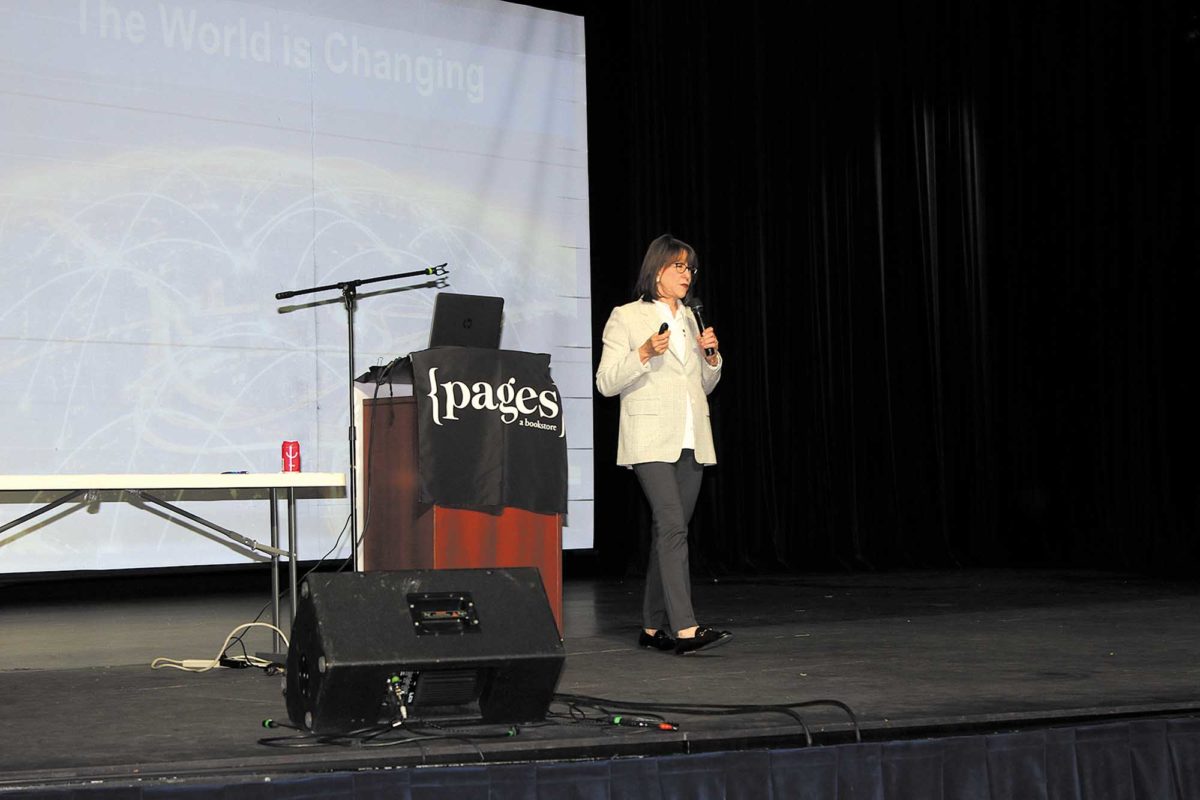Expert warns that social media, academic pressure weigh heavily on MCHS teens

Dr. Madeline Levine delivered a speech Tuesday at Mira Costa High School on parenting in the new age. Photo by: Kimberly Dester
A growing fact of life among teenagers striving for academic success is a significant rise in clinically diagnosed anxiety and depression. According to a report by the Child Mind Institute, one in three teenagers between the ages of 13 and 18 experience anxiety disorders. Depression and bipolar disorder affect 14.3 percent of teens in the same age range.
Madeline Levine, psychologist and author of “Ready or Not: Preparing Our Kids to Thrive in an Uncertain and Rapidly Changing World,” pointed to these trends as a cause for immediate action during the course of an appearance at Mira Costa High School Monday night. At the event, organized by South Bay Families Connected and Manhattan Beach Education Foundation (MBEF), Levine explored how the educational system and a new wave of parenting techniques are failing to prepare children for a precarious future in an ever-changing world, putting an emphasis on social media and parental interference (“helicopter parenting”) and a fear of an outside world that kids have become out of touch with because of rapid technological advancement.
“While genetics loads the gun, environment pulls the trigger,” Levine said. “Somewhere between 30 and 40 percent of an anxiety disorder is genetic. I’m going to assume nothing has changed in our genetics. What has changed is the environment.”
Levine is a founding member of the Challenge Success Program, which partners with schools and communities to ensure student well-being while preparing kids with the tools to be successful both in school and out in the world.
“Dr. Levine addresses what resonates in kids and how to prepare students to be resilient,” said Hilary Mahan, executive director of MBEF.
“Mira Costa is a Challenge Success school,” said Mahan. “MBEF strives to provide resources to all stakeholders — parents, students, and faculty — and to provide a wealth of knowledge and exposure. We are in a highly academic community with high standards, which is important to embrace; but it is also important to address wellness.”
Levine spent the evening touching on issues such as academic stress, fear of failure, and a growing apprehension regarding change among students. She said in this time of political, technological, and even environmental upheaval, it’s particularly important to provide children freedom to explore opportunities without being fearful of failure, consequences, or parental interference.
“You have to have, I guess, a kind of enthusiasm for change,” said Levine. “If you don’t, you’ll be left behind. There are plenty of kids who are cultivating a real curiosity and asking themselves, ‘What else can I do?’”
But navigating an uncertain world and exploring adolescent curiosities is sure to be a scary feat, she said, and this is seen in the rising number of teens suffering from anxiety disorders.
Mahan said MBUSD is far from immune from these struggles.
“There has been a significant rise in anxiety and substance abuse,” said Mahan. “We’re in this together as a community, and it’s our job at MBEF to provide students with proper tools and resources.”
In what Levine referred to as “compulsive comparison,” teens are subject to comparing their accolades and success to their peers on social media. Along with comparison amongst themselves, teens also suffer from sleep deprivation, an overload of homework, and a feeling of not being heard by their parents.
“We don’t listen enough,” said Dr. Levine. “I’ve been a psychologist for 35 years — no child has ever come into my office and said, ‘You know, my parents just listen too much.’”
Levine stressed the importance of letting children fail and navigate through periods of change without interference to aid in growth. She said that it’s crucial for children to develop the ability to maneuver through change and learn problem-solving on their own in order to be successful in more than just academics.
“While we hope that our children will do well in school,” said Dr. Levine, “we hope with even greater fervor that they will do well in life.”

